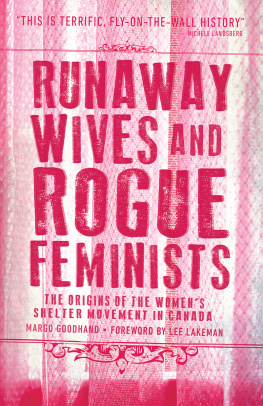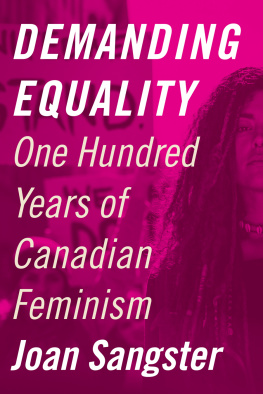PENGUIN CANADA
TEN THOUSAND ROSES
JUDY REBICK is one of Canadas best-known feminists and political commentators. She is the publisher of Canadas irreverent web magazine rabble.ca, author of Imagine Democracy and Politically Speaking, with Kik Roach, and the Sam Gindin chair in social justice and democracy at Ryerson University. Judy appears frequently on radio and television and is a columnist for Herizons magazine. She is also a former president of the National Action Committee on the Status of Women, Canadas largest womens group. She lives in Toronto.
ALSO BY JUDY REBICK
Politically Speaking (with Kik Roach)
Imagine Democracy
TEN THOUSAND ROSES
THE MAKING of a FEMINIST REVOLUTION
JUDY REBICK

PENGUIN CANADA
Published by the Penguin Group
Penguin Group (Canada), 90 Eglinton Avenue East, Suite 700, Toronto, Ontario,
Canada M4P 2Y3 (a division of Pearson Penguin Canada Inc.)
Penguin Group (USA) Inc., 375 Hudson Street, New York, New York 10014, U.S.A.
Penguin Books Ltd, 80 Strand, London WC2R 0RL, England
Penguin Ireland, 25 St Stephens Green, Dublin 2, Ireland (a division of Penguin Books Ltd)
Penguin Group (Australia), 250 Camberwell Road, Camberwell, Victoria 3124, Australia
(a division of Pearson Australia Group Pty Ltd)
Penguin Books India Pvt Ltd, 11 Community Centre, Panchsheel Park, New Delhi 110 017, India
Penguin Group (NZ), Cnr Airborne and Rosedale Roads, Albany, Auckland, New Zealand
(a division of Pearson New Zealand Ltd)
Penguin Books (South Africa) (Pty) Ltd, 24 Sturdee Avenue, Rosebank, Johannesburg 2196, South Africa
Penguin Books Ltd, Registered Offices: 80 Strand, London WC2R 0RL, England
First published 2005
1 2 3 4 5 6 7 8 9 10 (FR)
Copyright Judy Rebick, 2005
Excerpt on page 245 from the song Du pain et des roses,
written by Marie-Claire Sguin and Hlne Pedneault and used as the theme song for the Marche des femmes contre la pauvret, Quebec, 1995.
Audre Lorde poem reprinted with permission, from Sister Outsider by Audre Lorde. Copyright 1948 by Audre Lorde, Celestial Arts, an imprint of Ten Speed Press, Berkeley, CA. www.tenspeed.com.
Speech given by Arundhati Roy in Porto Alegre, Brazil, in January 2003, reproduced in War Talk: Confronting Empire, published by South End Press, used with permission.
Page 271 constitutes a continuation of this copyright page.
All rights reserved. Without limiting the rights under copyright reserved above, no part of this publication may be reproduced, stored in or introduced into a retrieval system, or transmitted in any form or by any means (electronic, mechanical, photocopying, recording or otherwise), without the prior written permission of both the copyright owner and the above publisher of this book.
Manufactured in Canada.
LIBRARY AND ARCHIVES CANADA CATALOGUING IN PUBLICATION
Rebick, Judy
Ten thousand roses : the making of a feminist revolution / Judy Rebick.
Includes index.
ISBN 0-14-301544-3
1. FeminismCanadaHistory20th century. 2. Womens rightsCanadaHistory
20th century. 3. FeministsCanada. 4. Oral history.
I. Title.
HQ1453.R423 2005 305.42097109045 C2004-906316-2
Visit the Penguin Group (Canada) website at www.penguin.ca

To Norma Scarborough
and all the unsung heroes of the womens movement

Always cast your heart over the hurdle first; your body will be obliged to follow.
JUDITH THURMAN,
ISAK DINESEN: THE LIFE OF A STORYTELLER
INTRODUCTION
I N 1995 ALMOST EIGHT HUNDRED WOMEN marched from Montreal to Quebec City to demand the elimination of poverty. As they passed through towns and villages along the way, whole populations came out to greet them, and churches sounded their bells. One man, a rose grower in Drummondville, was so inspired that he brought ten thousand roses to Quebec City for the huge rally that greeted the marchers, and so, instead of placards, every person carried a rose. It is from this story that my book takes its title. The theme of the march was bread and roses, the anthem of the womens movement.
The symbolic meaning of the title is in the thousands of women who made the feminist revolution. A few have become well known, but there are so many women just as intelligent, capable and courageous. In these pages you will meet dozens of them, from a variety of class, ethnic and racial backgrounds, from a number of different political currents, and from many regions of the country. Like that rose grower from Drummondville, I hope you will find extraordinary inspiration in their stories.
The book was conceived as an oral history, reflecting the mosaic of the womens movement in Canada. Most histories are written from a single perspective. Feminism has taught me that your view of the world depends in no small measure on your location in it. What you see very much depends on where you stand. My experience in the world is as a middle-class, white, Jewish woman whose generation believed anything was possible. My political perspective as a socialist feminist provides a framework for understanding what I see. But feminism taught me to listen to other women. Opening my ears and my heart to themAboriginal, black, poor, immigrant, young and old, lesbian and straight, Qubcoise, disabled; from the West, the North and the East; from rural areas and from small townsopened my mind to new possibilities and enriched my life beyond imagining.
Sharing those stories was one reason to write this book, but there were others. When veteran feminist Kay Macpherson died in 1999, I started to feel an urgency to capture the extraordinary story of Canadian feminism while I could still talk to her generation of feminists. Before I had a chance to interview her, the groundbreaking Rosemary Brown, the first woman to run for the leadership of a national political party and the first black woman to serve in a provincial legislature, was also gone. Fortunately, I was able to talk to a number of other pioneers who blazed the trail for my generation and those to come.
When I graduated from McGill University in 1967, I wanted to be a journalist. Along with my male colleagues at the McGill Daily, I applied to a local radio station. We dont hire girls in the newsroom, the station manager told me. Why not? I asked. Because the men swear and they wouldnt be comfortable with a woman around. I dont give a shit if they swear, I responded. And then I was doubly damned because not only was I a woman but a foul-mouthed woman. Remembering how far we have come in a single generation is also a way of making sure we never go back.
Another inspiration was Susan Brownmillers In Our Time, a history of the American womens liberation movement that focuses on grassroots activism. Reading Brownmiller, I was struck by how much more interesting and effective the Canadian womens movement has been. Unlike in the United States, womens liberation in Canada started with an alliance between older feminists and young radicals. In Canada, too, socialist feminists played an important role from the beginning, making sure that the interests of working-class women were part of the movement. The resulting alliance between autonomous womens groups and women in the labour movement has made our trade unions the most feminist in the world. Finally, through the efforts of women of colour and Aboriginal women, we succeeded here for a time in creating a multiracial womens movement, with strong leadership from women of colour, Aboriginal women and immigrant women. To my knowledge, this has not happened anywhere else in the world. We havent overcome the divisions created by racism, but we have learned a lot about constructing alliances across the differences created by race, class, and national and ethnic divisions, alliances essential to creating a better, more egalitarian, world.
Next page








